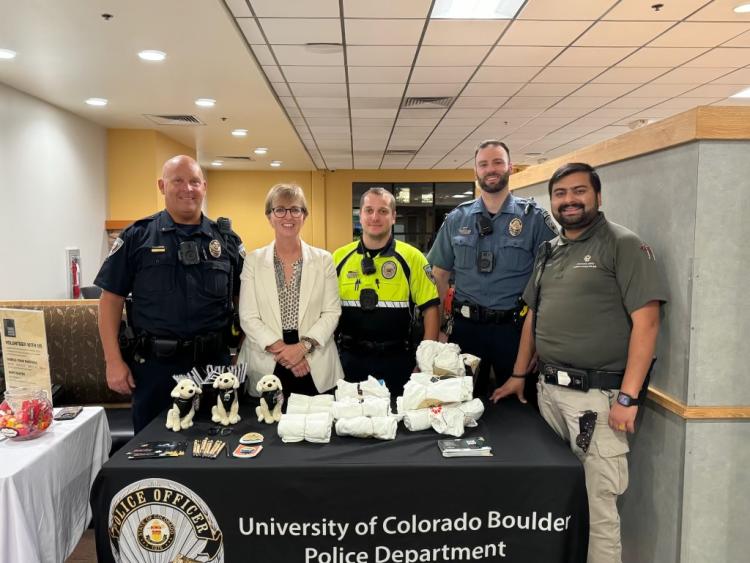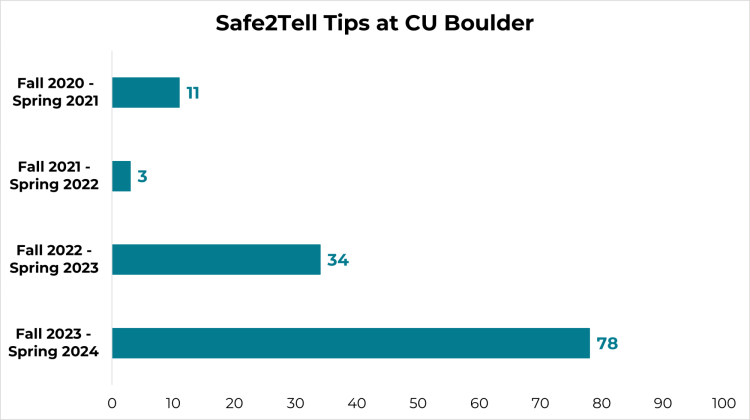More people using Safe2Tell to report safety concerns

From left: CUPD Commander John Monahan, Prevention Science Program Senior Researcher Sarah Goodrum, Residential Service Officers Gabe Ross and Eric Donoghue, Community Safety Official Muskan Ghimire
Many Colorado students grew up learning about and possibly using Safe2Tell in their K-12 schools. Safe2Tell is a tool that allows anyone to anonymously share their concerns about potential harm or violence through an online form, by phone or via an app.
Safe2Tell is a statewide program developed after the 1999 Columbine High School shooting and managed through the Colorado Office of the Attorney General. It encourages “upstanders” to come forward with information on potential violence or self-harm to prevent it from occurring.
“We know from research on averted acts of violence that upstanders’ tips provide critical information to help prompt investigations and prevent harm,” said Sarah Goodrum, a research professor in the Prevention Science Program at CU Boulder.
Goodrum studies violence prevention and threat assessment and led the effort to develop, test and launch campaign messages about Safe2Tell at CU Boulder. “We’re thrilled to see that more people at CU Boulder are using Safe2Tell’s tip line to report their safety-related concerns following the launch of the public awareness campaign,” she added.
July 2022 marked the first community safety presentation on Safe2Tell at CU Boulder. By July of the following year, CU Boulder had launched a public awareness campaign with presentations, videos and social media messages to educate the campus community about the availability of the tool.
Goodrum is pleased the campaign is already yielding positive, measurable results. “It’s great to see so many more people deciding to be helpful upstanders and sharing concerns to help keep our community safer.”

CUPD and the Prevention Science Program first started collecting data on the number of outreach efforts and the number of Safe2Tell tips coming into CU Boulder during the 2020–21 academic year, before Safe2Tell was widely promoted. During that time, the university received 11 Safe2Tell reports. Comparatively, during the 2023–24 academic year, CU Boulder received 78 reports, a 609% increase in tips between 2020–21 to 2023–24.
The CU Boulder Police Department, part of the Division of Public Safety, promotes Safe2Tell as one option for anonymously sharing safety-related concerns with people who can help. “Safe2Tell is becoming more well-known as a viable option for university students, faculty and staff, as well as community members, including parents of CU Boulder students,” said Deputy Chief Mark Heyart. “It’s anonymous, available 24/7, 365 days a year, and is a great way to share concerns about circumstances, like threatening behavior, even after hours,” he added.
Depending on the nature of the concern, the Division of Public Safety’s coordinated threat assessment process may include additional resources. CU Boulder’s Student Support and Case Management office connects students with assistance, such as mental health resources, support resources and intervention for students. If the concern involves employees, the Behavioral Intervention Team will be made aware.
Thanks to funding from the Colorado Department of Public Safety, CU Boulder’s College of Arts and Sciences’ Division of Social Sciences will be working on a new project to promote a culture of safety within the division and on campus.
“In partnership with the Social Sciences, we are going to conduct focus groups with students, faculty, and staff to learn about their perspectives on and experiences with physical and psychological safety. The findings from those groups will inform the direction of the project over the next year,” said Goodrum.
Other ways to share concerns and receive support
In addition to reporting tools, CU Boulder has confidential support resources for the campus community.
- The Office of Victim Assistance offers confidential support, including free trauma-specific counseling services as well as victim advocacy (helping people know their rights and options and get assistance navigating systems), to CU Boulder students, staff and faculty who have experienced and/or witnessed traumatic events, including but not limited to crime, abuse, assault, violence, harassment, stalking, discrimination and more.
- Counseling and Psychiatric Services offers confidential, on-campus mental health and psychiatric services for a variety of concerns such as academics, anxiety, body image, depression, relationships, substance use and more. This office serves CU Boulder students.
- Faculty and Staff Assistance Program offers confidential counseling to serve the emotional and psychological needs of CU Boulder employees. All FSAP staff are trained as generalist counselors and are equipped to deal with a wide range of mental health, personal and work-related issues. You must be a CU Boulder employee to use FSAP services.
It is important to note that Safe2Tell does not fulfill mandatory reporting requirements for CU Boulder employees. Responsible employees who become aware of protected-class discrimination, harassment, or sexual misconduct are required to report to the Office of Institutional Equity and Compliance, as described here on the Don’t Ignore It website. Employees who are designated as Campus Security Authorities also do not satisfy their reporting requirements by using Safe2Tell and should report Clery Act crimes to CUPD using the CSA Reporting Form.


